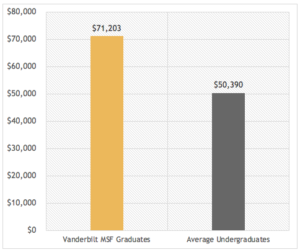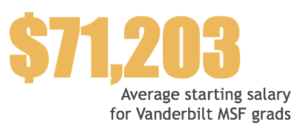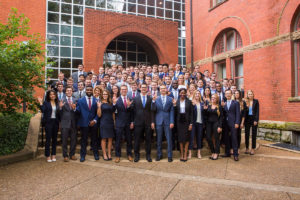By Kara Sherrer
Finance professionals know the importance of an ROI — and that’s why Master of Science in Finance (MSF) candidates are very focused on the value they’re going to get from these one-year graduate programs. To figure out the payoff of getting an MSF degree, we’ve broken down the value into six components: a second chance at finance recruiting, a high starting salary, personalized career coaching, access to employers, the alumni network, and the brand name of the school. Read on to find out how a Master of Science in Finance could pay off for your career.
Second Chance at Finance Recruiting
Some students went to a college where finance companies simply didn’t recruit, or a liberal arts institution that didn’t offer a finance curriculum. Others didn’t realize that they were interested in finance until later in their undergraduate career, after recruiting deadlines had already passed.
“I don’t think anybody should have to commit to what they want to do when they’re 19. But if you don’t know by the time you’re a sophomore, you really miss out on a lot of opportunities,” said Maura Clark, Director of Admissions for the MSF program at Vanderbilt Business. “This is a great degree option if you feel like you’re coming too late to the game, if you figured out that you want consulting or banking and you were a junior in college — in some of those industries that’s too late (for undergraduate recruiting).”
High Starting Salary
 The average starting salary for the Vanderbilt Business MSF Class of 2017 was $71,203. With average starting salaries for U.S. college graduates hovering around $50,000, that’s a significant increase of about 40% with just one extra year of school. Plus, whatever starting salary you get directly after school tends to anchor any future pay increases you might receive, so starting strong right out of the gate is important.
The average starting salary for the Vanderbilt Business MSF Class of 2017 was $71,203. With average starting salaries for U.S. college graduates hovering around $50,000, that’s a significant increase of about 40% with just one extra year of school. Plus, whatever starting salary you get directly after school tends to anchor any future pay increases you might receive, so starting strong right out of the gate is important.
“If you come out of school and you’re making $40,000 (for example), odds are your next job is not going to be $71,000. And your responsibilities are not going to be $71,000 responsibilities,” said Cherrie Wilkerson, Assistant Dean for Young Professional Programs. “Our financially motivated students are doing the numbers, and they say ‘yes, it’s a good payoff.’”
Personalized Career Coaching
Career coaching at business school is more high-touch and customized than at the undergraduate level. Coaches help MSF students achieve their goals, and sometimes even open their minds to career possibilities they didn’t know they wanted. For example, Vanessa Arndt (MSF’16) entered the MSF program thinking she would get a job in finance. But through her work with the Career Management Center, she realized that consulting would actually be a great fit, and she now works at Bain & Company as a Senior Associate Consultant.
“The MSF program…helped me understand what I was truly looking for in a job, and not just what I thought I wanted or ‘what everybody else does,’” Arndt said. “I am now in a job that I truly enjoy, and I am excited about going to work every single day — okay, almost every day. Without the MSF program, I would not be as happy in my life and career as I am right now.”
Access to Employers
 Depending on where they went to undergrad, a Master of Science in Finance program can give students a pipeline to companies and jobs that they couldn’t have recruited for on their old campus. “I think for students, they see a very clear return on their investment because they have access to employers and positions that they feel they would never have the opportunity to interview with (otherwise),” Clark said.
Depending on where they went to undergrad, a Master of Science in Finance program can give students a pipeline to companies and jobs that they couldn’t have recruited for on their old campus. “I think for students, they see a very clear return on their investment because they have access to employers and positions that they feel they would never have the opportunity to interview with (otherwise),” Clark said.
Getting a good job at a major financial or consulting firm also pays dividends for students’ careers later on, as it sets them on a path for success from the very beginning. “It puts students on a different ladder than they would have been on with their undergrad,” Wilkerson said.
Alumni Network
Going to an MSF program gives you access to the business school’s alumni network, significantly augmenting that of your undergraduate institution. For example, Vanderbilt Business MSF students get access to 10,000+ Owen alumni plus all the Vanderbilt undergraduate alumni, a very large network indeed. And of course, MSF students bond closely with others in their program, often leading to life-long friendships as well as a professional network of peers.

The MSF Class of 2019
“What you get with the Owen MSF program is not just a fantastic education, but a network of incredibly smart, diverse, motivated, and well-rounded classmates and friends,” said Sam Gillespie (MSF’13), Private Banker at JP Morgan. “It feels like everybody around you — classmate, faculty, or staff — is working their very hardest to make sure you get the best possible outcomes after you walk out that door. I would certainly not be where I am today without my Owen MSF degree, and I am very grateful for everyone that helped me get here.”
Brand Name of School
Whether or not they’re reaching out to an alum, students at prestigious MSF programs often find that the school name opens opportunities that might not otherwise be available to them. Wilkerson recalled a recent anecdote that one of the current MSF students relayed to her: “One student told me yesterday that he had been trying to reach someone repeatedly while he was in undergrad, with no response,” she said. “He comes here, (reaches out) with his Vanderbilt email, and the (contact) responds. It opens up a network for them that they simply have not had exposure to.”
Want to learn more about the Master of Science in Finance at Vanderbilt Business? Visit the program page or request more information.